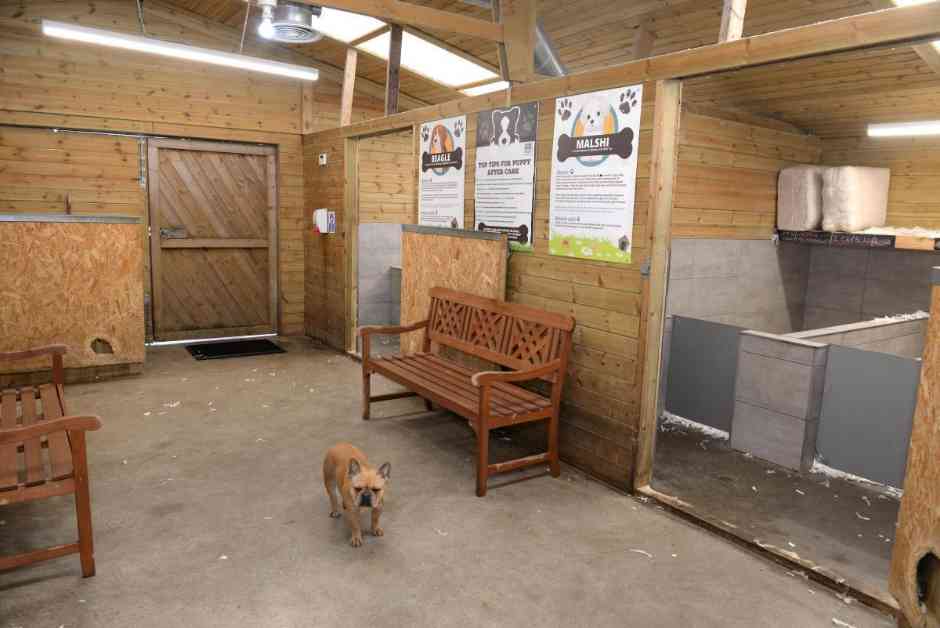Concerns Over Puppy Trade Route from Fermanagh to England
There is a 350-mile puppy trade route from Fermanagh to England that has raised significant concerns among animal welfare advocates. The journey takes approximately seven and a half hours by road to reach a puppy breeding kennels in Lancashire, which sells dogs bred in Fivemiletown after receiving a license from Fermanagh and Omagh District Council.
Douglas Hall Kennels, registered on the Clabby Road but actually based in England, has come under scrutiny for its operations and the welfare of the puppies it sells. The company’s website states that it takes puppy care very seriously and ensures that all puppies for sale are well looked after. It also mentions being regulated by the local Pendle Borough authorities and having weekly visits by a vet to maintain hygienic and clean facilities.
Despite these assurances, the company faced disappointment in 2019 when a planning application to sell puppies bred off-site and expand its facilities was denied. The application sought to change the operations from solely breeding puppies to a mixed use of breeding, selling puppies, and offering a dog petting service. It also aimed to extend the site’s car park, but concerns about the impact on the conservation area led to the refusal of the application.
Opposition and Criticism Towards Douglas Hall Kennels
Several animal rights campaigners raised objections to the application, citing concerns about puppy welfare, the space available for expansion, and the overall operations of the business. The kennel faced criticism regarding the welfare of puppies sold at the establishment, with campaigners questioning the origins of the puppies and expressing worries about their health.
Louise Brown, founder of the group Lancashire Against Puppy Farming, criticized the lack of transparency and claimed that the kennel sourced puppies from large-scale commercial breeders, often referred to as puppy farms. Despite objections and over 15,000 people signing a petition against the planning application, Pendle’s Barrowford and Western Parishes committee approved it.
In response to the criticism and concerns raised, William Lancaster, the owner of Douglas Hall Kennels, defended his business by asserting that the kennel adhered to all relevant regulations and that the puppies were well looked after with round-the-clock supervision. He argued that shutting down licensed breeders like his would only drive the trade underground, making it impossible to ensure animal welfare.
Public Outcry and Calls for Stricter Regulations
The issue of puppy smuggling and illegal breeding practices has garnered national attention, prompting calls for stricter regulations in the industry. Dogs Trust issued a call for the government to crack down on the cruel practice of puppy smuggling, highlighting concerns about illegal puppy farming in Lancashire.
Pendle MP Andrew Stephenson addressed the issue in the House of Commons, emphasizing the shocking conditions in which puppies were smuggled across Europe to be sold in the UK. He highlighted the risks associated with illegal breeders falsifying documents and families unknowingly purchasing sick puppies.
The growing public outcry led to demands for stricter regulations in the industry, as concerns persisted about the health and welfare of puppies sold by licensed breeders. Despite passing inspections by Environmental Health, campaigners like Ms. Brown remained skeptical of the kennel’s operations and urged for more stringent oversight.
In an interview with the Lancashire Telegraph, a local protester shared her personal experience of purchasing a puppy from Douglas Hall Farm, only to discover that the dog had a congenital liver condition. The ordeal caused emotional and financial distress, highlighting the impact of irresponsible breeding practices on unsuspecting families.
Continued Advocacy for Animal Welfare
Despite the challenges and controversies surrounding the puppy trade route from Fermanagh to England, animal welfare advocates continue to push for greater transparency and accountability in the industry. Calls for stricter regulations, enforcement of existing laws, and increased awareness about the risks of supporting irresponsible breeders remain at the forefront of their advocacy efforts.
As the debate over puppy farming and smuggling intensifies, the need for collective action to protect the welfare of animals has become more urgent. The stories of suffering and neglect experienced by innocent puppies serve as a stark reminder of the importance of ethical breeding practices and responsible pet ownership.
In conclusion, the 350-mile puppy trade route from Fermanagh to England has become a focal point for discussions on animal welfare, regulation of the breeding industry, and the ethical considerations of purchasing pets. The controversies surrounding Douglas Hall Kennels and the concerns raised by animal rights campaigners underscore the need for greater oversight and accountability in the trade of companion animals. By working together to address these issues and prioritize the well-being of animals, we can create a safer and more humane environment for all creatures.




















